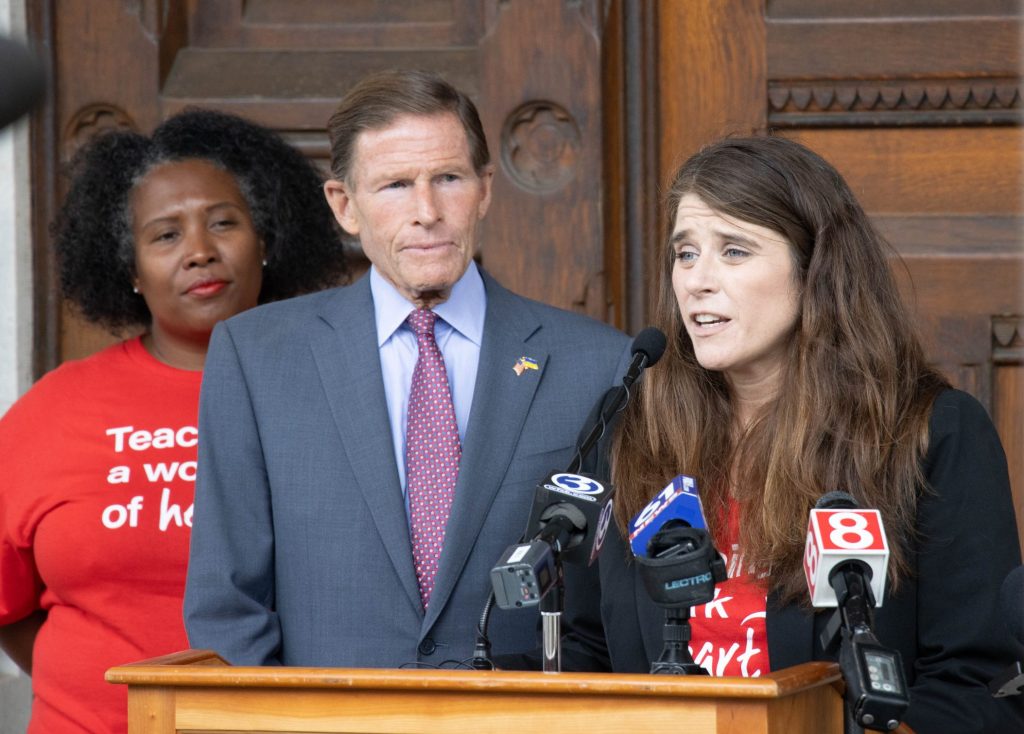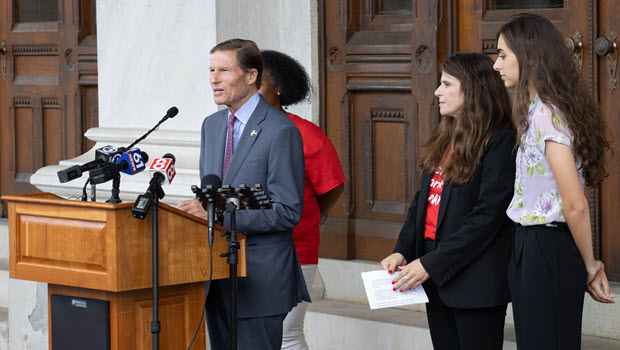“Connecticut is suffering from a desperate teacher shortage,” said Senator Richard Blumenthal. “The people of Connecticut should be deeply disturbed, alarmed, and angry that we have that teacher shortage here when we have the power to avoid it.”
Blumenthal was speaking at a press conference in Hartford last week where he was joined by CEA Vice President Joslyn DeLancey, CEA Aspiring Educators Chair Emma Sands, and Bloomfield Education Association President Gail Jorden to draw attention to the teacher shortage and what the federal government needs to do to help.
DeLancey underscored that the lack of teachers in our classrooms is already at a crisis level. “We’re starting the year with classrooms that do not have assigned teachers,” she said.
When she started teaching two decades ago, DeLancey remembers worrying about securing a job, as there were thousands of educators looking for positions. Now schools are scrambling to fill vacancies.
“We didn’t get here by accident,” she said. “We’ve had 20 years of attacks on public education. We’ve had stagnant teacher salaries. We’ve had policies that—while some might have been well intended—have been woefully damaging to the success of our students.”
She continued, “There is no profession that is more joyful, rewarding, and fulfilling than education. We are not doing enough, however, to show that we respect this profession, that it is a noble and awesome profession, and that we will pay what we should be paying to those people who have put the time, care, and commitment into doing the work and supporting our students.”

CEA Vice President Joslyn DeLancey and Bloomfield Education Association President Gail Jorden (at left) spoke at a press conference organized by Senator Blumenthal.
“Right now, teachers earn only 24% of professionals with similar educations,” Blumenthal said. “That wage gap, that discrimination in compensation, is simply intolerable. That wage gap is bigger in the U.S. than in other industrialized countries.”
Some of the federal legislation Blumenthal is advocating for includes
- the RAISE Act, which would allow educators to claim a maximum of $15,000 in refundable tax credits,
- the Loan Forgiveness for Educators Act, which would offer loan forgiveness (up to $17,500) for teachers who are highly qualified, teach full time in a low-income school, and complete five years of consecutive service, and the
- Diversifying by Investing in Educators and Students to Improve outcomes For Youth (DIVERSIFY) Act, which would increase the TEACH Grant award to support students interested in becoming teachers, ensuring an education workforce that is as diverse as the students it serves.
“The RAISE Act, which would give federal tax credits to teachers, not only would this show a nationwide commitment to a very vital profession, but it would also put money in our pockets and allow for us to live in the communities where we teach,” DeLancey said.
Sands, a senior at Eastern Connecticut State University, said, “Often teachers are spending their own money to supply and enrich their classrooms and their students, while having to get a second job just to make ends meet. The new tax credit would help alleviate some of that burden on those teachers.”
DeLancey added that student loan forgiveness is also essential for educators. “In a world where our college loans and expectations for teachers are growing exponentially, I can’t speak enough to how important it is to have loan forgiveness for our educators,” she said.
The need to ensure a diverse teacher workforce is also crucial, DeLancey said. “Not only do we want to work in a world where our colleagues are diverse, smart, and talented—our students need to have teachers in their classrooms who look like them, can relate to them, and can connect at different levels.”
“This needs to become a more desirable career. Everyone should want to be a teacher,” said Jorden. “There is literally no other job where you get to touch the future in such a meaningful and positive way.”
DeLancey concluded, “If we don’t act now, we will continue to see the loss of people from this vital, awesome profession.”







